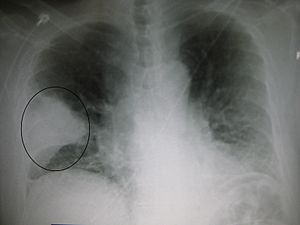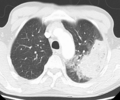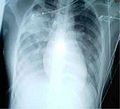Pneumonia facts for kids
Pneumonia is a disease that affects your lungs and how you breathe. Your lungs have tiny air sacs called alveoli. They help your body get oxygen from the air you breathe. When you have pneumonia, these sacs get swollen and fill with fluid. This makes it hard for them to take in enough oxygen. So, it becomes hard to breathe. You might feel short of breath or have chest pain when you breathe. Pneumonia can be very serious, especially for certain people, even with medical care.
Contents
What Causes Pneumonia?
Pneumonia can be caused by tiny germs like bacteria, viruses, or fungi. Sometimes, it can also happen if your lungs are damaged by certain chemicals or other physical problems. Other health issues can also make someone more likely to get pneumonia.
People with pneumonia usually have trouble breathing. They might also cough a lot or feel pain in their chest. The way doctors treat pneumonia depends on what caused it. If bacteria caused it, doctors can give you antibiotics to help you get better.
Who Can Get Pneumonia?
Anyone can get pneumonia, but it can be more dangerous for some people. It is especially risky for very old people or those with a weak immune system.
In some parts of the world, like India, Nigeria, and Pakistan, pneumonia used to be a leading cause of death for young children. However, with better healthcare and practices like breastfeeding, fewer children are dying from it today. Breastfeeding helps newborn babies fight off infections like pneumonia.
Different Kinds of Pneumonia
There are several types of pneumonia, depending on what causes them or how they affect the lungs:
SARS Pneumonia
SARS is a very contagious and serious type of pneumonia. It first appeared in 2002 after starting in China. SARS is caused by a germ called the SARS coronavirus, which was new to scientists at the time. Luckily, new cases of SARS have not been seen since June 2003.
BOOP Pneumonia
BOOP stands for "bronchiolitis obliterans organizing pneumonia." It happens when the small airways in your lungs get swollen or irritated. It's also known as cryptogenic organizing pneumonitis (COP).
Eosinophilic Pneumonia
This type of pneumonia occurs when special white blood cells called eosinophils invade the lungs. Eosinophilic pneumonia often happens if you have an infection from a parasite or if you've been around certain things in the environment.
Chemical Pneumonia
Chemical pneumonia, also called chemical pneumonitis, is caused by harmful chemicals like pesticides. These chemicals can get into your body if you breathe them in or if they touch your skin. If the harmful substance is an oil, it might be called lipoid pneumonia.
Aspiration Pneumonia
Aspiration pneumonia happens when you accidentally breathe food, drink, or stomach contents into your lungs. This can happen while eating, or after vomiting. These materials can damage your lungs and sometimes lead to an infection because they might contain bacteria. Aspiration pneumonia is a common problem for people in hospitals or nursing homes who might not be able to cough strongly enough to protect their airways.
Images for kids
-
The bacterium Streptococcus pneumoniae, a common cause of pneumonia, imaged by an electron microscope
-
A chest x-ray of a patient with severe viral pneumonia due to SARS
-
WPA poster, 1936/1937
See also
 In Spanish: Neumonía para niños
In Spanish: Neumonía para niños
 | Sharif Bey |
 | Hale Woodruff |
 | Richmond Barthé |
 | Purvis Young |








